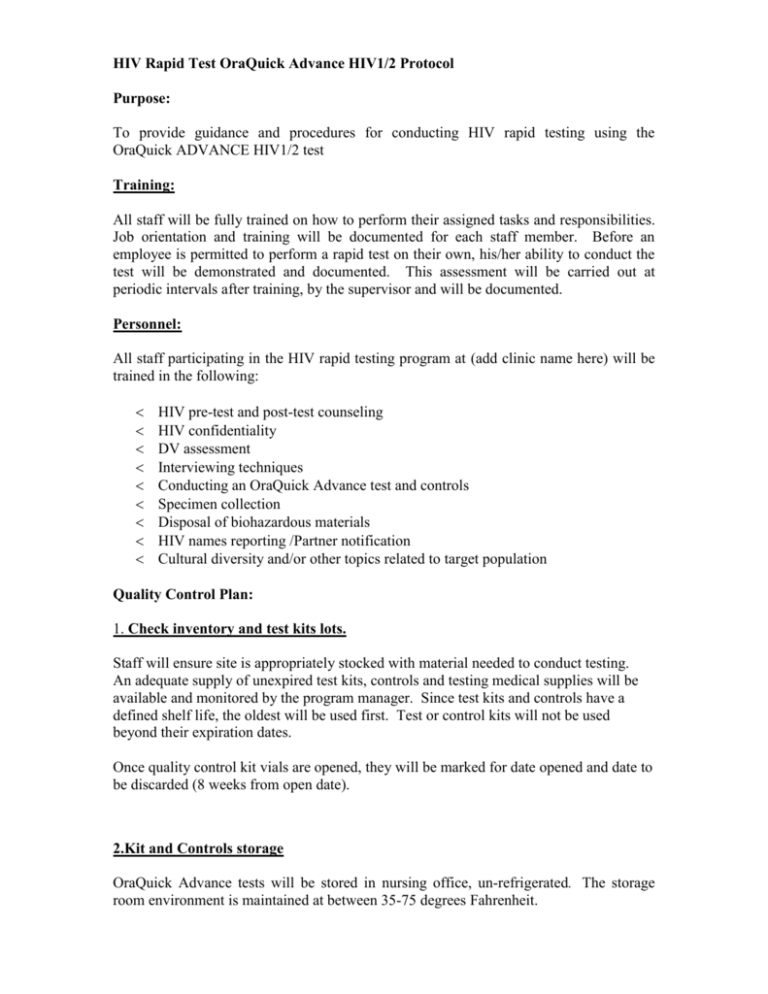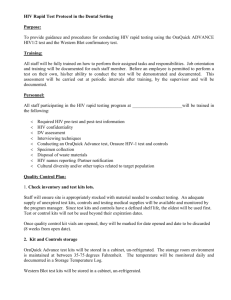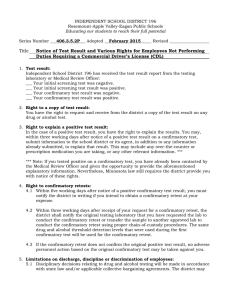HIV Rapid Test OraQuick Advance HIV1/2 Protocol
advertisement

HIV Rapid Test OraQuick Advance HIV1/2 Protocol Purpose: To provide guidance and procedures for conducting HIV rapid testing using the OraQuick ADVANCE HIV1/2 test Training: All staff will be fully trained on how to perform their assigned tasks and responsibilities. Job orientation and training will be documented for each staff member. Before an employee is permitted to perform a rapid test on their own, his/her ability to conduct the test will be demonstrated and documented. This assessment will be carried out at periodic intervals after training, by the supervisor and will be documented. Personnel: All staff participating in the HIV rapid testing program at (add clinic name here) will be trained in the following: HIV pre-test and post-test counseling HIV confidentiality DV assessment Interviewing techniques Conducting an OraQuick Advance test and controls Specimen collection Disposal of biohazardous materials HIV names reporting /Partner notification Cultural diversity and/or other topics related to target population Quality Control Plan: 1. Check inventory and test kits lots. Staff will ensure site is appropriately stocked with material needed to conduct testing. An adequate supply of unexpired test kits, controls and testing medical supplies will be available and monitored by the program manager. Since test kits and controls have a defined shelf life, the oldest will be used first. Test or control kits will not be used beyond their expiration dates. Once quality control kit vials are opened, they will be marked for date opened and date to be discarded (8 weeks from open date). 2.Kit and Controls storage OraQuick Advance tests will be stored in nursing office, un-refrigerated. The storage room environment is maintained at between 35-75 degrees Fahrenheit. Controls will be kept in a refrigerator medication refrigerator which is monitored by the Program staff. To ensure the temperature is within the limits of the acceptable range of 35 to 46 degrees Fahrenheit, a daily reading of the thermometer inside the refrigerator will be documented on a Refrigerator Temperature Log. Accuracy of thermometers will be monitored every 6 months, and batteries checked. 3. Temperature monitoring and maintenance Staff will check temperature daily. A thermometer will be kept in the storage room where the OraQuick Advance test kits are stored, and staff will record the storage temperature in the Storage Temperature Log. A thermometer will also be kept in the testing area. Each time a test or a control is conducted the room temperature shall be recorded in the Testing Area Temperature Log. All of the above logs will be kept in one binder with dividers to keep them readily available. The Clinical Supervisor shall review the logs, note and sign that the logs were reviewed once a week. Corrective action for temperatures that go above and below the range will include adjustment to the environmental condition (heat/air conditioner). If storage temperature falls out of range, an external control will be performed on the supply to ensure product quality. Action will be documented and reviewed by supervisor. The Program Coordinator will ensure that the controls, testing device and developer solution, once removed from the refrigerator, have come to room temperature between 59 and 99 degrees Fahrenheit before opening and using. 4. Testing area readiness: Lighting and testing surface Tests are conducted in a counseling room, which is environmentally stable, well-lit, and has a stable surface (counter top/table). The supervisor will conduct periodic direct observation of testing activities to ensure corrective action will be taken, if necessary. External Quality Control(QC) QC is performed with a negative/positive test as required by manufacturer. Each new tester will run a control as part of training, when a new test kit lot is opened, when a new shipment comes in, if the temperature of the storage area falls outside of the temperature range, and/or if the test area falls outside of the temperature range. In addition, control tests are done every month. If either the negative or positive controls do not provide expected results, the supervisor will be notified. Staff will review process for conducting the control with a new control kit to rule out cross contamination. If corrective action does not resolve the problem, testing with the kits will cease and the company will be contacted. To detect and resolve problems that occurs at any point in the testing process, especially those that may affect the accuracy of test results, staff will follow guidance for: When to discontinue testing (e.g., when the external control results are unacceptable as described in the package insert or the test results are Invalid more than once). How to take corrective action in response to a problem (e.g., contacting the supervisor when the external control results are unacceptable). How to document problems and the action taken (e.g., a logbook where problems and corrective actions taken can be recorded). How to verify that the corrective actions taken addressed the problem Significant problems will be immediately reported to the appropriate supervisory personnel/laboratory director. External control records will include the date and time of control testing, lot numbers and expiration of the test kit, lot number and expiration date of the controls, control results and corrective action taken if control results are unacceptable. Control records will be kept in the logbook and in the order in which they were completed so they can be easily compared with the test records. This will assist in finding answers if there are questions about testing performed within a specific time frame. Confidentiality Standard HIV confidentiality measures, in compliance with New York State HIV Confidentiality Law (Public Health Law Article 27-F will be followed in the case of rapid testing. Test results are covered under the confidentiality policies of Article 27-F of the Public Health Law and cannot be shared with others. All client and partner information is confidential, whether the client is tested or declines testing. Releasing of test results or any information leading to disclosure of the identity of a client without the written consent of the client is a breach of confidentiality and punishable by applicable statutes and administrative regulations. Pre-test and post test counseling are performed in a closed counseling room one-on-one. The door of the counseling room will be closed when performing the oral fluid specimen collection. Clients who are tested are then asked to wait in a separate waiting area or may come back within 30 minutes for results. Clients are given test results in a closed room, one-on-one. Files with identifying information are kept in a locked cabinet in a locked room at the program. These files are only accessible to the counseling/testing staff and the Clinical Supervisor. Clients will be informed of the legal requirement of names reporting to the NYS Department of Health in the event of a positive result, and the limits of confidentiality (harm to self or others.) Testing Procedures All testing will be conducted in compliance with Article 27 F of the PHL. All clients will be provided part A of the HIV informed consent, the subject information sheet and part B to obtain a signature for the informed consent according to the NYS Public Health Law. Staff will collect (oral fluid) specimens as per manufacturers requirement The test will be process as per manufacturer’s instructions (20 minutes). Staff will read and record the test result on a Lab Result Slip. Staff will report the result to client; ensure client understands meaning of result. Staff will document results in client chart and on master log. Staff will clean up testing area and dispose of biohazardous waste as indicated. For a reactive test result confirmatory testing will be conducted immediately. Confirmatory testing and linkage to care All individuals who have a preliminary positive HIV antibody test using the OraQuick Advance test will be offered an on-site confirmatory test utilizing the (oral fluid specimen) test will be referred to ___________(explain how you will ensure confirmatory testing). Follow-up appointments to give results of confirmatory testing will be within___ days. Tracking of confirmatory testing If the person refuses the confirmatory test at that time, the tester will attempt to document the reason why (i.e. previously known HIV positive, want to go to different provider) and offer another appointment for a follow-up (explain how). If the person does not come in for their confirmatory result, the follow-up appointment protocol will be utilized for up to 12 months to track the client. For discordant confirmatory test results (rapid HIV positive test/Negative confirmatory test), the client will be instructed to retest in 30 days if they have continued risk. Since most confirmatory results will be positive the possibility of specimen mix-up for these clients will be reviewed. For repetitive reactive oral fluid specimens, a confirmatory test with a blood specimen will be done or arranged through a referral to a medical provider. Occasionally, confirmatory test results are indeterminate. If the Western blot is indeterminate, it will be recommended that the client return for repeat testing in one month for the original test date. Linkage to care At the time of the initial positive result, the tester will inform the client of available care sites, in preparation for the confirmatory test to be HIV positive. (explain agency referral and follow-up systems) Site disposal of medical waste All materials from the test kits, used gloves and absorbent counter cover shall be place in the red biohazard containers for disposal. A commercial medical waste company will pick the containers up once a week at the office. Laboratory Guidelines OraQuick ADVANCE Rapid HIV-1/2 Antibody Test ORAL METHOD This procedure is for use with oral specimens. Equipment: Test Stand Developer Solution Vial Specimen Collection Loop Unexpired Test Device Disposable Gloves Biohazard Disposal Container Timer or Watch Thermometer Pre-Collection: 1. Prepare patient field and assemble supplies by opening the two chambers of ADVANCE divided pouch, leaving Test Device in pouch. Check expiration date. 2. Seat patient comfortably 3. Remove the Developer Solution vial. 4. Remove cap on Developer Solution vial. 5. Slide Developer Solution vial into Stand, making sure not to splash contents and vial is seated in bottom of the slot in the Stand. Collection: 6. Put on a new pair of gloves 7. Have person being tested remove the Test Device from its Pouch. DO NOT ALLOW person to touch the Flat Pad. Check that an absorbent package is included with the Test Device. 8. Direct the person to place the Flat Pad above the teeth against the outer gum. Direct the person to gently swab completely around the outer gums, both upper & lower, one time around, using the Flat Pad. Instruct the client not to swab roof of mouth, inside of cheek or the tongue. Both sides of Flat Pad may be used. 9. Instruct person to insert the Flat Pad of the Test Device all the way into the Solution Vial. Make sure Flat Pad touches bottom of Solution Vial. The Result Window should be facing towards you. 10. Start timer. The window will look pink and will gradually disappear as the test develops. 11. READ the results after 20 minutes, but not more than 40 minutes in a fully lighted area. Do not remove Test Device from Vial until you have read the results. 12. Refer to the Test Result & Interpretation of Test Result section in the package insert. Post-Collection: Dispose of Test Device & Solution Vial according to infectious waste procedures. Dispose of gloves and wash hands Result Reporting: Record results in Log Book. Criteria for corrective action: Test Device is expired. Test Device not packaged with absorbent package. Area being tested does not fall between 59-99 degrees F. Reading test results earlier or later than 20 minutes. Laboratory Director: ______________________________ Date: ____________




